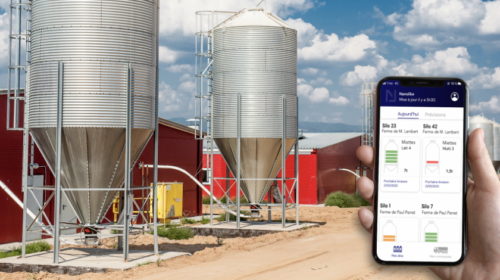Nanolike has introduced a new digitised silo fill level monitoring solution for the livestock industry. The goal is to simplify the inventory and order management processes of pig, poultry and cattle farmers, as well as to optimise the supply chain processes of the animal feed producers and suppliers who replenish the silos. This not only saves costs but also reduces the environmental impact as it enables route optimisation.
What makes the new digitised silo fill level monitoring solution stand out is the highly efficient sensor and cloud connectivity technology, using the Sigfox 0G wireless network. Requiring zero maintenance for years, the solution needs neither an external power supply nor a data line, which saves costs and ensures that the digitisation investment is amortised very quickly. This makes Nanolike technology highly disruptive, as it can replace any alternative sensor technology used exclusively to manage replenishment management.
Users of Nanolike’s digitised silo fill level monitoring solution are found in all sub-sectors of livestock farming, from pig, poultry and cattle rearing to dairy and egg production and fish farming. However, Nanolike’s digitised silo fill level monitoring solution isn’t just for livestock farmers and agricultural cooperatives in their role as silo operators; it also targets silo manufacturers who aspire to include this technology in their portfolios and, above all, animal feed producers and suppliers aiming to offer their customers automatic replenishment, vendor-managed inventory (VMI) or similar solutions as part of their digitisation strategies.
Quickly and easily mounted on the exterior base of the silo, the Nanolike sensors give users 24/7 access to information on fill levels and demand forecasts in real-time. This digital solution makes it much easier to monitor the silo fill levels and greatly reduces users’ workload as they no longer have to climb to the top of silos at different locations to check the fill levels. Instead, all required inventory management tasks can be done in less time from the safety of the office. An integrated early warning system alerts the silo operator to potential bottlenecks, which helps to prevent feed shortages.
Based on real-time data, the mobile application also facilitates the automation of purchase processes as silo operators can choose to place orders directly from their smartphones. Such an integrated solution, which can be implemented with just a few clicks, greatly simplifies communication between livestock farmers and their suppliers. What is more, it makes it possible to optimise the supply to distributed silos at a higher level, leading to overall savings in transport logistics, which ultimately also improves the long-term CO2 balance. The data from the Nanolike sensors are consolidated in a central cloud from where they can be imported into existing software systems and customer clouds, or retrieved via smartphone app at any time.
The digitised fill level monitoring solution from Nanolike is extremely easy to implement, as it is self-calibrating, does not require active calibration, and filters out undesirable environmental influences. Before filling a silo, the user sets the sensor to zero via the mobile phone app and manually enters the fill load once in the software. From thereon, the changing fill level is calculated in the cloud, based on a comparison of sensor data recorded before and after filling. The solution is extremely scalable and can be extended from a simple cloud app for a batch size of 1 to fleets with thousands of silos. For the latter, Nanolike also offers a convenient data interface for the connection of external IT solutions.
The digitised fill level monitoring solution from Nanolike is available for order now from batch size 1. Larger-scale silo operators and their suppliers may request a free demo installation. Cooperatives, animal feed producers, and suppliers of silo technology are also invited to get in touch to evaluate the potential for developing collaborative solutions to digitise their fill level sensor technology.
Source: IOT NETWORK NEWS





